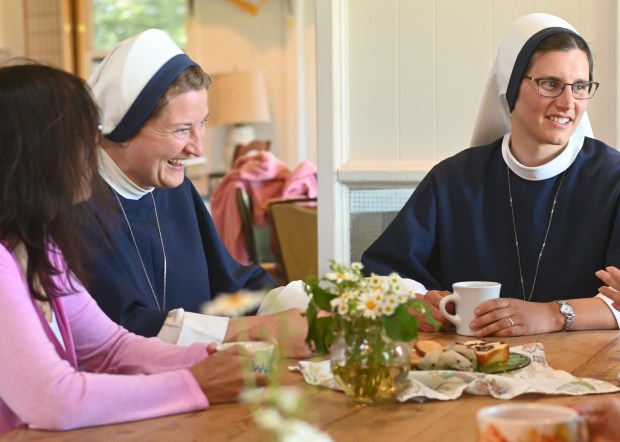Winston Churchill’s famous saying, “There’s something about the outside of a horse that’s good for the inside of a man,” contains a deep truth; when we allow ourselves to rest in something beautiful, we find ourselves changed. It’s almost as if beauty opens the back door of our hearts, allowing God’s goodness to sneak in and capture us. With a widened heart, we become more open to receive truth, drawing us to Truth Himself.
At our hectic crisis mission in Manhattan where we serve vulnerable pregnant women, we have perfected the art of the tea party. Yes, really. It might seem too contradictory to be real, but not only have we come to appreciate the art of leisure; we’ve seen how essential it is for others to receive the truth of their own goodness. When a woman in crisis comes to us -- after bringing her a tray with cute mugs, fancy teas, and a hefty plate of cookies -- we sit with her. Simply receiving her very being. What does she love, what brings her joy? And letting her heart unfold with all its sorrows and scars.

We’ve all had the experience of some sort of crisis, small or large, boxing us into tunnel vision and forcing us to make choices without real clarity, unable to weigh the consequences of all our decisions. But there’s something about true leisure that breaks open our narrow mind, makes us able to receive reality for what it is, and find the goodness in it.
There’s something about true leisure that breaks open our narrow mind, makes us able to receive reality for what it is, and find the goodness in it.
One pregnant woman in crisis came with us to our camp in upstate New York. Out of all the day’s activities -- apple-picking, grass-rolling, taking in the gorgeous view -- talking about the pregnancy wasn’t one of them. Yet being refreshed by the greenery of fall after a life in New York’s concrete jungle, she turned to one of our Sisters and said, “You know ... I think I can do this.” Her openness to the reality around her led to her openness to herself, and her own capacity for love. Through beauty, we can come to grasp the utter gratuitousness of life, and live in a way that doesn’t take possession of reality, but receives it as a gift, seeing the Creator’s reflection in it all.
This is what John Paul II described as the "contemplative outlook," in his encyclical The Gospel of Life. Real leisure leads us to see reality as gift. And when we receive reality as gift, it impels us to respond with a gift of self in love and thanksgiving to the Giver, drawing us into deeper conformity with Jesus’s own attitude towards the Eternal Father. In His perfect humanity, Jesus reveals us to ourselves, demonstrating to us what it means to be truly human.
But can drinking a cup of tea really make me more human?
Our culture’s idea of leisure has become reduced to Netflix binging or swimming on a white sand beach somewhere in the Bahamas. But these things often leave us drained and ready for another vacation when we encounter the daily grind with all its humdrum realities. So, what is real leisure?
If the contemplative outlook is a way of seeing, leisure is a way of being. The man who literally wrote the book on leisure, German philosopher Joseph Pieper, describes leisure as an "acquiescing in one’s own being" -- an acceptance of one’s own being as a free gift. It’s not the attitude of those who grasp, but those who openly receive everything, "free and easy in themselves — almost like a man falling asleep, for one can only fall asleep by 'letting oneself go'" (see Leisure: The Basis of Culture).
Leisure isn’t a state of mind — it’s a state of being, a disposition of receiving reality with open hands as a gift from the Father. It’s not an escape from reality, but rather the affirmation and celebration of it. Leisure, in itself, is not simply peace or rest, according to Pieper. These are the fruits of leisure, and if we approach leisure in order to attain the fruits alone, we won’t find them. Only when we develop eyes to see and receive the Father’s gifts do we find peace and rest.
But honestly, when we’re in crisis, reality doesn’t seem like the Father’s gift. Can it really be called good if the person I love is sick, or my job is taking a turn for the worst? This is where we must lean on faith. When we step out in naked faith, offering a gift of praise and thanksgiving to the Father for the gifts we feel we are blind to, we can trust that His Spirit is working deep in our hearts to draw us to a closer union with Him.
“God offers us a short route to the possession of Himself,” says St. Augustine. “He cries out: Love me and you will have me, for you would be unable to love me if you did not possess me already!” (Sermon 34).
And, taking time to enjoy His creation, a theophany of love addressed to man, will also help us along the way. From all eternity, He knew that you would delight in that blooming flower, that book, or that song on the radio. If He cares about the little things that move you, how much more does He care about the deep desires of your heart! We pray that the Holy Spirit would widen our hearts to receive every gift the Father wishes to pour out on us.




